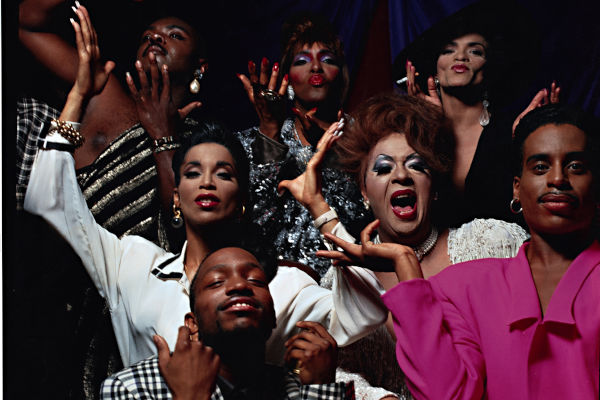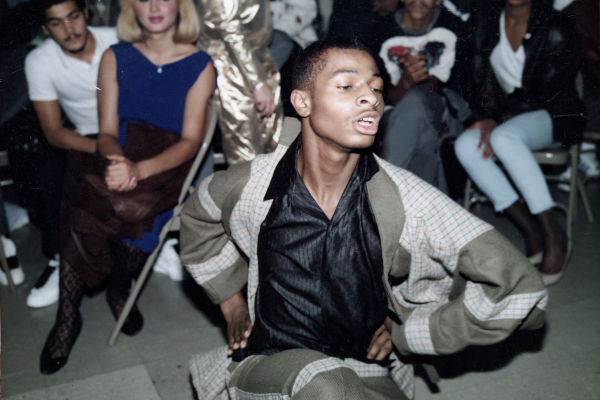
Paris is Burning
By Marc Francis
The 1990 documentary Paris is Burning has slayed its way into the US film canon, implanting itself in documentary 101 and queer theory syllabi at college campuses across the world, and influencing wildly popular TV shows such as Pose and RuPaul’s Drag Race. Given this enduring legacy that spans documentary and queer circles, it might be difficult to imagine that the film has faced criticism. Black feminist critic bell hooks in her 1992 book Black Looks accused the film’s white lesbian director Jennie Livingston of making an ethnographic film. hooks argues that the black and brown subjects are made into mere objects of exotic curiosity for a predominantly white audience. hooks also charges the film with upholding the idealized images of white wealth to which its subjects aspire. For example, Paris is Burning fails to scrutinize Venus Extravaganza’s desire to be an affluent white woman, leaving unexamined any thoughtful links between formations of race, gender and structures of capital. Queer theorist Judith Butler would respond to hooks in their 1996 book Bodies that Matter, reiterating their own theories on gender performativity in the process.


Butler overtly critiques hooks’s anti-drag viewpoint, namely that gay male drag primarily mocks femininity and exercises power and control over the feminine. For Butler, all gender expression is drag, so the film might actually attune its audience to the phantasmatic status of gender’s “realness,” as something caught in a cycle of proving itself time and time again, as we see play out in the competitive categories in the film as much as on the street in everyday life. Butler maintains that the contests, spaces, and modes of embodiment seen in Paris is Burning hold subversive possibilities of appropriation not because the subjects transgress gender boundaries, but because they denaturalize the very idealizations of race, gender, and class to which American culture anxiously clings.
These claims still surface in debates about the film that persist today. Most galvanizing among them has been bell hooks’s argument that Livingston asserts a quiet, omniscient, white, and therefore ethnographic gaze (a point with which Butler agrees, with qualification). This pushback has incited other works to revise Livingston’s approach. The TV series Pose, now airing its third and final season, sought to serialize the stories introduced in Paris is Burning (with name changes, of course).
Executive Producer Ryan Murphy would make a landmark decision to hire a team of trans and black writers and producers, mollifying concerns about white authorship. The 2016 documentary Kiki—a film festival favorite that did not gain its sea legs in the wider market—went back to the NY ball scene to cover a new generation of young voguers who follow in the footsteps of legends Pepper LaBeija and Willi Ninja. Though the film’s directorial credit goes to a white Swedish lesbian, Kiki’s subjects were consulted throughout the process, initially telling the director, “it’s not going to be about us, without us.” Arguably, neither Pose nor Kiki can compete with the phenomenon that is RuPaul’s Drag Race, a show that has re-echoed the lexicon and spirit of Paris is Burning week after week for its incredible twelve-year run. Each season—which includes the show’s international franchises—the girls must perform a “reading” of the other queens like those that appear to spontaneously happen in the documentary. And to add to it, the queens love to call “shade” whenever there are signs of backstabbing and scheming. Cue Dorian Corey in Paris is Burning breaking down reading versus shade—learn it and learn it well!
Paris is Burning and its cast of subjects have in many ways realized their destinies as legends: immortalized through popular serialized fiction, monetized for unscripted TV (and by Madonna before that!), and worshipped as framers for subsequent generations of voguers, drag queens, and other participants who still seek refuge in the ball scene. These heirs to the house of Paris is Burning may offer their own forms of cultural value, but none have been able to match the vitality, wit, passion, and vulnerability captured in the film that began it all. Now make room, it’s time to let the “real” queen step through.
Marc Francis
Marc Francis is an archivist, lecturer, curator, editor, and writer in Los Angeles, CA. He received his PhD in Film and Digital Media Studies from the University of California, Santa Cruz. His essays have appeared in Camera Obscura, [In]Transition, Jump Cut, and Film Quarterly. He is currently working on a book about the programming of canonical queer films in 1970s and 1980s US art house cinemas.



